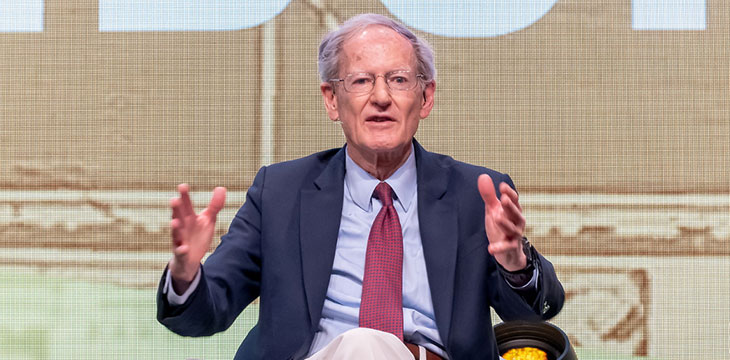|
Getting your Trinity Audio player ready...
|
Does Bitcoin solve some of the problems that plague the world economy? According to the famed economist, writer, investor, and technology visionary George Gilder, it does.
In his keynote presentation at CoinGeek London 2020, Gilder spoke about two of the problems that the world economy faces: the collapse of internet security and the scandal of money. He also discussed why those problems exist and how Bitcoin might be the piece of the puzzle that leads to improvement in the world economy.
Let’s take a closer look at the problems Gilder described and why Bitcoin might be the solution.
There’s a two-fold scandal in the world economy
About two minutes into Gilder’s presentation, he spoke about two significant problems the world economy faces: the collapse of internet security and the scandal of money.
The collapse of Internet Security
Consumers worry about the information they post online and what happens to it; the general public is well aware that data giants like Google, Facebook, and Amazon are harvesting their data and selling it for revenue. They also know that they never see any of the profit that they helped these tech giants generate.
To add insult to injury, not all platforms that consumers publish information to or enter their data on are safe. According to Gilder, 2019 was one of the worst years for internet security. When data is kept in a centralized location, it becomes easy for attackers to pick their targets. When information is kept in a data center and is hacked or breached, a hacker/attacker can make off with the personal identification information of every consumer whose PII is on that database. This makes a centralized database the perfect target for attack because a hacker can kill multiple birds with just one stone.
The scandal of money
The world’s biggest industry is currency trading; according to a 2019 survey by the Bank for International Settlements, $6.6 trillion is traded in the currency markets each day—but currency trading does not create value. Currency traders thrive on the instability of an economy; they make the most profit when imbalances in the world economies create significant misalignments and arbitrage opportunities across the world currencies. But currency trading does not encourage consumer to consumer, consumer to business, or business to business value creation and transfer in an economy, in other words, real value creation and exchange.
Enter the Cryptocosm
However, the features inherent to Bitcoin make it the perfect protocol to optimize the current internet and solve the scandal of money.
At the moment, the world plays by the rules created by tech giants like Google, where the focus is on the user and communication first. This is why we can use services like Google and Facebook for free.
But what does life after Google and Facebook look like?
According to Gilder, life after Google and Facebook looks like a world where the focus is on security. A world where information is owned by its creators—not its distributors. In this model, consumers are protected against security threats that are outside of their control, and because they own their data, they can profit from it. In this new internet, the Metanet, a user can choose to sell their data or provide information at a cost. On Bitcoin, all of the features required to make this model a reality exist.
The Bitcoin solution
Bitcoin provides a solution to the collapse of internet security and the scandal of money. Unlike data centers and tech giants, Bitcoin is decentralized. Its public ledger is stored on nodes all across the globe. As long as at least two nodes remain running and a majority of the nodes in the system are acting honestly, the Bitcoin network will live on and will have an almost non-existent chance of a hack or manipulation occurring.
In addition, when an individual publishes information to the bitcoin blockchain, they are the owner of that data and can generate revenue from their data. For instance, the BSV application Twetch allows users to generate revenue each time an individual, comments on their post, likes their post, shares their post, or follows their Twetch account. There is value in information; they say data is the new oil; for most consumers who use traditional social media, these metrics (likes, shares, comments, followers) go unrewarded yet, produce income for the platform provider. But on bitcoin, the consumer is empowered and receives the benefits that have historically only been granted to tech giants.
When it comes to the scandal of money, “money” on the bitcoin network is a measuring stick, not a magic wand. Only 21 million bitcoin will ever exist, and one bitcoin is always equal to one bitcoin. When the economy is in turmoil, the government can not wave a magic wand and inject more bitcoin into the economy to relieve it of its instability. Instead, Bitcoin obtains its value via proof-of-work. If a business or service has been created on bitcoin that has real utility and users where economic exchange happens daily, then the value of bitcoin will reflect that—unlike in the currency trading and precious metals markets, where the value of the assets at hand can easily be manipulated by individuals trading the asset.
In Review
We encourage you to watch Gilder’s presentation if you were not able to attend CoinGeek London and see it in person, or watch the livestream as it happened. But to quickly summarize Gilder’s talk, Bitcoin can solve some of the most pressing problems in today’s world, especially when it comes to internet security and measuring real economic value. Gilder believes that the ‘laws” we currently live by—the laws created by tech giants like Google and powerhouses like the legacy banking system—are flawed in many ways, but Bitcoin can be the remedy and serve as the infrastructure that is used to build the future that empowers the citizens of the world.

 03-04-2026
03-04-2026 




